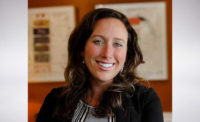Name/Title/Company: MaKayla Romey (Kovac), facilities mechanical engineer, National Renewable Energy Laboratory (NREL)
Age: 29
Educational Experience: Bachelor’s degree in mechanical engineering from University of Colorado-Boulder in Partnership with Colorado Mesa University
Professional Credentials/Accreditations: Professional engineer (P.E) and Certified Energy Manager (CEM)
Organizational Affiliations/Achievements/Awards: ASHRAE member and International Institute for Sustainable Laboratories (I2SL) Colorado Chapter Director
What does your day-to-day job entail?
My day-to-day job focuses on research support and campus mechanical facility support and operation. I am the subject matter expert (SME) for all things mechanical on NREL sites in Colorado. That means what I do each day can vary quite a bit. My day can consist of providing simple mechanical infrastructure design modifications for laboratories, review of larger external architecture and engineering (A&E) designs for existing lab or facility modifications or new lab buildings, providing recommendations for optimization of campus mechanical infrastructure, providing mechanical support for our Smart Labs program, and more.
What caused you to/when did you fall in love with engineering?
I didn’t know what I was really getting into when I signed up for the engineering program in college. I wouldn’t say I necessarily fell in love with engineering, I would say I originally fell in love with the challenge. I love what I do now as a career and at NREL because of the constant challenge and that everyday there is something different. Nothing at NREL is copy-paste. I love that I am constantly learning from my peers. I love helping people and everything I do at NREL is in support of our researchers to help them develop science to help the world.
What has been the most rewarding/proudest aspect of your engineering career?
The most rewarding aspect of my engineering career is the internal satisfaction when I help to solve a pressing issue. And the knowledge that what I am doing, even though it's in an indirect way, is going to help make our planet a better place to live for years to come.
What challenges do women face in this profession? Can you give a personal example? Why aren’t there more women in engineering? How can we increase the number of women in engineering?
I think one of the main challenges women face in the engineering industry is unconscious bias — whether it be by others or women themselves. The thought that women are not as good at math and science as men (or are not as dedicated because they may have a family and kids to take care of) is false.
I myself have experienced this unconscious bias. I’ve noticed myself not speaking up in larger groups but instead whispering to my peers or mentors’ potential problems with designs or comments on optimizations because I was unsure of myself or didn’t want to ask a dumb question.
I think there are multiple reasons there are not more women in engineering, including, as previously stated, the bias or stereotype that it is a “man’s” job and the lack of early exposure to STEM education (I was never encouraged by anyone outside my family to pursue a science or math-based education and didn’t know much about engineering itself until college). The idea that the only way you can be good at your job or retain an engineering job is if you work 40-plus hours a week can discourage many women who have other aspirations for a better work-life balance.
I believe the best way to increase the number of women in engineering is by representation and mentorship. I think more women engineers need to be involved in early STEM education, university outreach, and mentorship throughout early career stages so that women continue to stay in their engineering career.
How many years have you been active in the engineering sector? What’s changed the most in that time? What’s changed the least?
I graduated college in 2017 and have been active in engineering since. What has changed the most in my engineering career has been the hard push for decarbonization/electrification and the advances in the HVAC equipment and manufactured technology to get us there.
What has changed the least is the safety standards, specifically the laboratory airflow requirements for safety. There is not a widespread knowledge that more air changes within a lab does not always mean safer. There is complacency in the industry to continue to “just do what has been done.”
Tell us about some of the work you’re doing in laboratory ventilation risk assessments through NREL’s Smart Labs program.
The laboratory ventilation risk assessment is a small portion of the Smart Labs program. The overall goal of Smart Labs is to better operate laboratory buildings to be safer and more efficient. A laboratory typically consumes three to 10 times more energy than a similarly sized commercial building, with most of that excess energy due to mechanical ventilation. The idea of Smart Labs is to provide the right airflow to the right spot at the right time. A laboratory ventilation risk assessment is an assessment that can provide a quantitative value to a qualitative assessment of the lab. I have been working on a user-friendly spreadsheet that will make it easier for environment, safety, health, and quality (ESH&Q) and ventilation SMEs to determine minimum ventilation requirements for the lab. These minimum requirements that are built into the spreadsheet are based on the guidance from ANSI Z9.5-2022 guidance that “establishes minimum requirements and best practices for laboratory ventilation systems.” Fitting a quantitative number to qualitative data makes it easier to assess current operations of a large amount of labs at once and determine areas for improvement in operation.
Share your greatest accomplishment as director of the International Institute of Sustainable Laboratories’ (I2SL) Colorado chapter.
For the short amount of time I have been on the I2SL Colorado Chapter board (eight months), I would say my biggest accomplishment is helping coordinate our largest attended quarterly event ever for the chapter at the University of Wyoming, where we toured their newest science/lab building. Attendees consisted of A&E design firms, higher education facility operators/sustainability managers, equipment vendors, and more.
What drives/motivates you every day?
What motivates me most is the opportunity to continue to learn and solve challenging problems. I enjoy being challenged and am very thankful to work at a company that is always encouraging new ideas and continuing education.
What remains on your engineering bucket list — what do you aspire to do that you haven’t accomplished yet?
I aspire to bring NREL lab buildings up to Smart Lab standards. We haven’t gotten to the implementation phase of the Smart Labs program yet. My ultimate goal for the rest of my career at NREL is to get multiple lab buildings recognized as a Smart Lab building.
What’s one thing no one knows about you?
I cannot think of one thing no one knows about me, but a lot of people in my engineering world do not know that I played four years of NCAA Division 2 softball while obtaining my engineering degree. In those years, I was a four-time All Rocky Mountain Athletic Conference (RMAC) recipient, three-time RMAC player of the year, and a two-time All-American.
List any mentors who’ve helped you succeed and describe precisely how they’ve shaped your success.
My biggest mentor, challenger, and cheerleader in the mechanical engineering sector has been my boss Anna Hoenmans. She has helped refine my technical skills, encouraged me to always ask “why?” and “how can it be better?” and has taught me to have the confidence in myself as an engineer and a person to face any challenge engineering or life throws at me.
My mother, Stacey McCarthy, who taught me to never let anyone tell me I can’t do anything, and how to turn negative criticism into fuel to propel myself forward.
My father, Kevin Kovac, taught me nothing in life will ever be handed to you; you must work for everything.
My grandmother and grandfather Carol and Charlie McCarthy taught me success is nothing unless you have people to share it with.
What advice do you have for prospective female engineers considering entering the field?
Don’t be afraid of the challenge, embrace it. The internal satisfaction you get when you finally succeed (and have confidence in yourself that you can and will succeed) will all be worth it. Network and explore your options and opportunities within the field.





